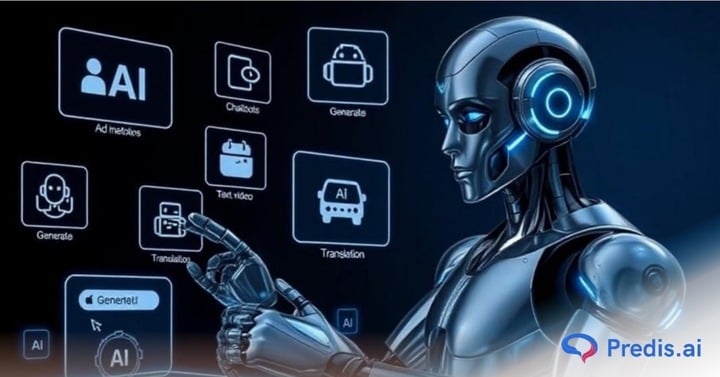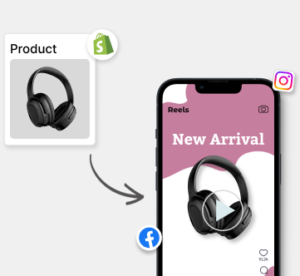The main difference between a chatbot and a smart agent is that one only answers questions, and the other makes sales. A simple FAQ bot might tell a customer your return policy, but a smart AI agent can handle the refund, suggest a replacement, and even sell more while doing it. That’s what’s changing right now.Companies can’t just use simple FAQ bots anymore. Customers want more than just scripted answers; they want quick, personalised, and action-oriented responses.
This shift is pushing businesses to adopt AI tools that can think, decide, and act in real time. Smart agents don’t wait for human input at every step but they guide conversations toward outcomes like bookings, purchases, or issue resolution. As a result, brands close more deals, resolve problems faster, and deliver experiences that feel effortless rather than automated.
You’re already behind if your bot can’t handle bookings, fix a problem, or move a lead down the sales funnel, especially with an AI customer service assistant for home service helping to streamline these tasks!
We’ll look at the Best AI Tools to Build Smart Agents in this guide. These agents can do more than just chat; they can also sell, help, and work with your workflows. We’ll explain the platforms that turn passive chat into active revenue, from lead capture to customer service automation.
Why Businesses Need AI Agents That Do More Than Chat?
Most chatbots today are little more than glorified search bars. They spit out canned responses, maybe point you to a help article, and then leave the customer hanging. For a deeper look at how modern AI agent platforms are evolving beyond basic bots, see AI Agent Platforms. That might have worked five years ago, but it doesn’t cut it anymore in today’s AI in Customer Service landscape. Smart AI agents are different. They don’t just talk; they do.
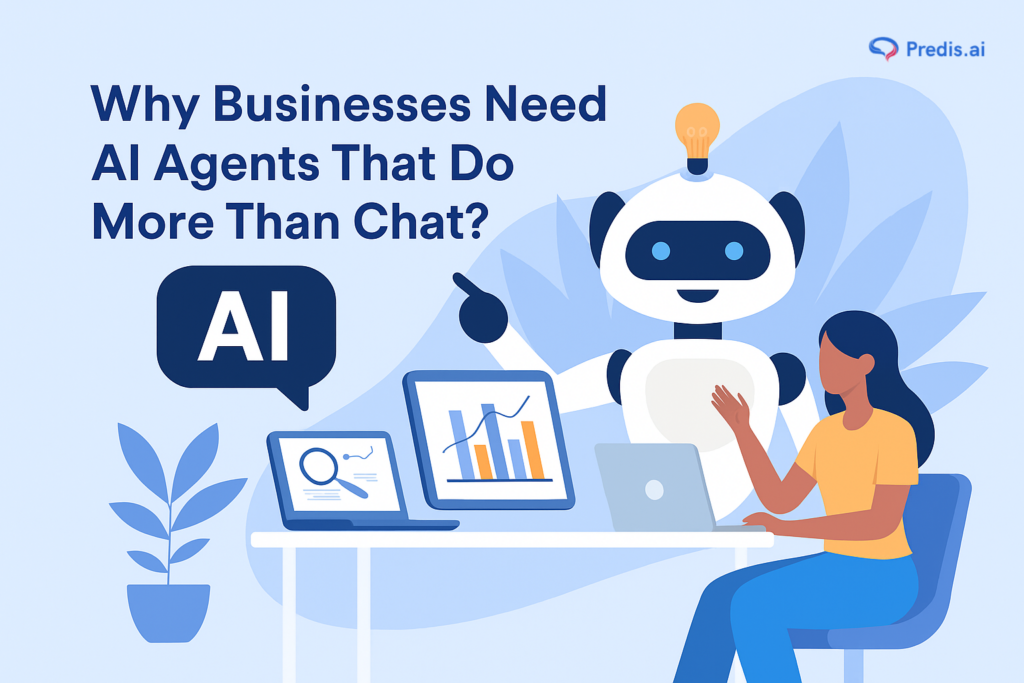
The best AI tools for making smart agents do more than just answer questions; they also do things in the real world:
- Do things right away: Make it easy for customers to book appointments with AI appointment booking, pay for things, change their orders, or fix problems.
- Automate lead nurturing: Follow up with leads, qualify them, and move them through the sales funnel without having to do it by hand. With integrated call analytics, the VoIP Phone System also gives you visibility into which conversations drive conversions, how prospects interact on calls, and which touchpoints influence their journey helping you prioritize the right leads and improve sales performance.
- Know when to escalate: Be able to tell when a problem needs human help and pass it on smoothly, without making the customer angry.
- Integrate everywhere: Connect with your Free CRM, ERP, email, and support systems so every interaction is synced with your business workflows enhanced by KYP.ai’s process intelligence software for real-time visibility, optimization, and smarter decision-making
- The payoff is clear: higher conversions, better customer satisfaction, and reduced support costs. Rather than serving as a barrier in the customer journey, intelligent agents transform into revenue-generating partners.
That’s why companies are shifting focus from chatbots to the Best AI Tools to Build Smart Agents-because only these tools can turn conversations into outcomes.
Core Capabilities of Smart Sales & Support Agents
A chatbot that only answers common questions isn’t enough anymore. Customers want things to happen quickly, get the right information, and have a good experience from start to end. That’s why visibility in AI is becoming just as important as functionality—customers need to easily find and trust these agents. Companies are spending money on the Best AI Tools to Build Smart Agents because these platforms have a lot more than just basic chat, often integrating with sales engagement stacks—so if you’re evaluating an alternative to Yesware, you can unify outreach, tracking, and AI-assisted responses in one workflow.
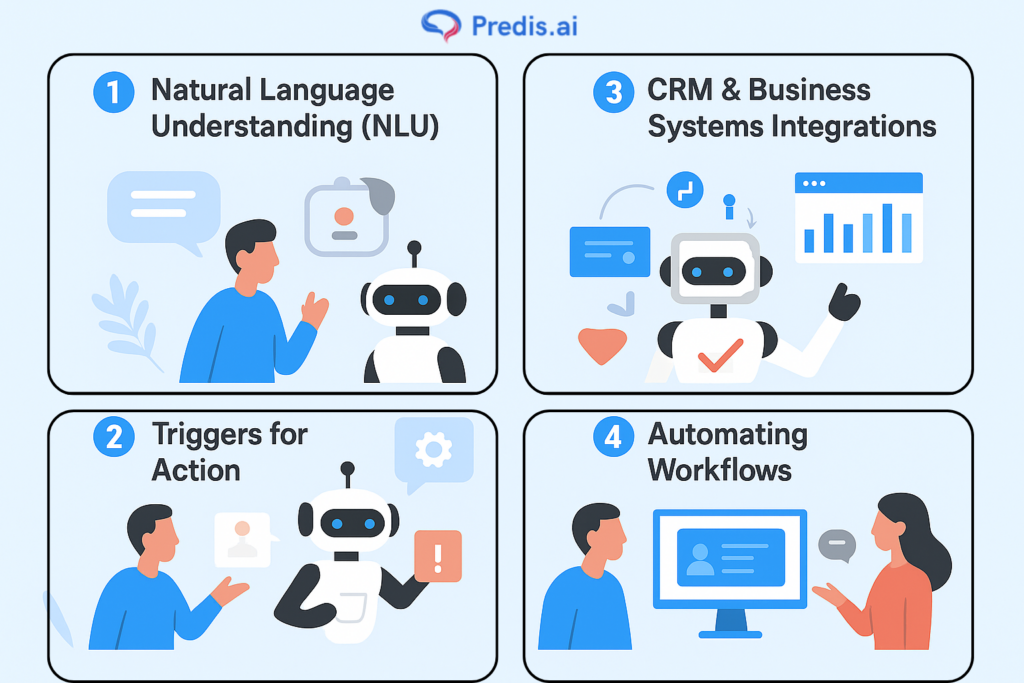
1. Natural Language Understanding (NLU)
Most of the time, customers don’t type in perfect sentences. They use slang, shorthand, or even switch topics in the middle of a conversation. In those moments, basic bots stop working. Smart agents with advanced NLU—built by an experienced AI agent development company—can understand what someone means and what they are doing in real time. They don’t just read from a script; they truly understand intent. This makes it easy to talk to people and feel like you’re speaking to a real human.
2. Triggers for Action
Just having information isn’t enough to close deals. It does. Smart agents can quickly do things like set up a demo, check the status of a delivery, or process a payment. Businesses can also implement an AI voicebot for sales and customer support to automate lead capture, handle inquiries, and guide customers through the sales funnel seamlessly
3. CRM & Business Systems Integrations
AI agents are strongest when they work together. When you connect directly to tools like Salesforce, HubSpot, Shopify, or even ERP systems like Dynamics 365 Business Central, every interaction becomes part of a larger ecosystem. Text.com, for example, leverages such integrations to enhance communication workflows, ensuring that each customer interaction is seamlessly tied to broader business systems and objectives.
This makes sure that no lead is lost, no order is missed, and every interaction with a customer happens in a context. This level of seamless integration is also a primary advantage of Custom ERP development, which aligns all agent interactions with internal systems. Data flows easily between systems, which helps sales, marketing, and support all stay on the same page.
4. Automating Workflows
Too many follow-ups can kill productivity without anyone knowing. Smart agents do them automatically. These workflows do their jobs on their own, like sending a drip email sequence to a prospect after they sign up, making a support ticket for a tech issue, or reminding a lead about a meeting that is coming up. What took place? Teams can spend more time on important conversations that need planning and creativity.
5. Human Escalation
No AI can (or should) handle everything. The smartest systems know when it’s time to bring a human in. But instead of dumping the customer into a new queue, smart agents hand over context-rich conversations so support or sales reps can jump in fully informed. That kind of seamless escalation keeps customers satisfied and prevents the “I already explained this” frustration.

Best AI Tools to Build Smart Agents
Not every AI platform is built to move beyond chat. To truly drive sales, support, and automation, you need tools designed to act, integrate, and learn from your business workflows. Here’s a breakdown of the Best AI Tools to Build Smart Agents in 2025 and what
makes each stand out.
1. Zapier AI Agents
Website Link: https://zapier.com/agents
Strength: Connects AI actions with 6,000+ apps.
Use case: Turn conversations into actions—schedule a meeting, update CRM, send a follow-up email.

Why it matters: Offers unmatched flexibility for startups and SMBs looking to scale without heavy tech overhead.
2. Knowmax – AI Guided Knowledge Management Platform
Website Link: https://knowmax.ai/agentic-ai/
Strength: Knowmax is an AI-Powerd knowledge management platform that helps CX teams streamline support. You can build a dynamic AI knowledge base software with decision trees, visual guides, articles, and FAQs. With Gen AI tools, it simplifies search, content creation, and migration. Analytics let you track usage, while seamless integrations ensure consistent support across channels. It also comes with a built-in learning system for agent training.

Use case:
- Contact Centers: Faster resolutions, fewer errors, higher CSAT/NPS
- Self-Service: Unified help via portals, apps, chat, and messaging
- Branches & Field: Real-time updates, no policy confusion, confident service
- Remote Working: Centralized knowledge in CRM, quick and consistent answers
- Professional Services: Hands-on support, smooth adoption, ROI-driven insights
Why it matters: Knowmax reduces average call handling time (AHT), boosts first call resolution (FCR), and enhances customer satisfaction while cutting operational costs. By bridging the gap between human agents and AI-driven self-service, Guru alternatives like this help businesses deliver seamless, scalable, and reliable customer support. Alternatively, Thena’s AI-powered knowledge base lets you create and manage help content for free, automatically generated from resolved support tickets.
3. Chat Data
Website Link: ChatData.com
Known for: Turning messy customer conversations into actionable sales and support insights.

Strengths:
- The system builds AI agents trained directly on your business’s chat data, support tickets, and transcripts.
- The system automatically identifies customer intent and recommends the next best course of action.
- We have a powerful analytics dashboard that monitors agent performance and sales conversations.
Best fit for:
- Businesses want AI agents that closely resemble how real customers interact with them, rather than generic models.
4. CloudTalk – AI-Powered Voice Intelligence Platform
Website Link: https://www.cloudtalk.io/
Strengths: CloudTalk is an AI-powered cloud telephony and call center platform that helps businesses automate and enhance customer conversations. It enables you to build smart voice agents that understand, route, and act on customer intent in real-time. With AI-driven call routing, live transcription, and analytics, CloudTalk transforms voice interactions into valuable business insights.
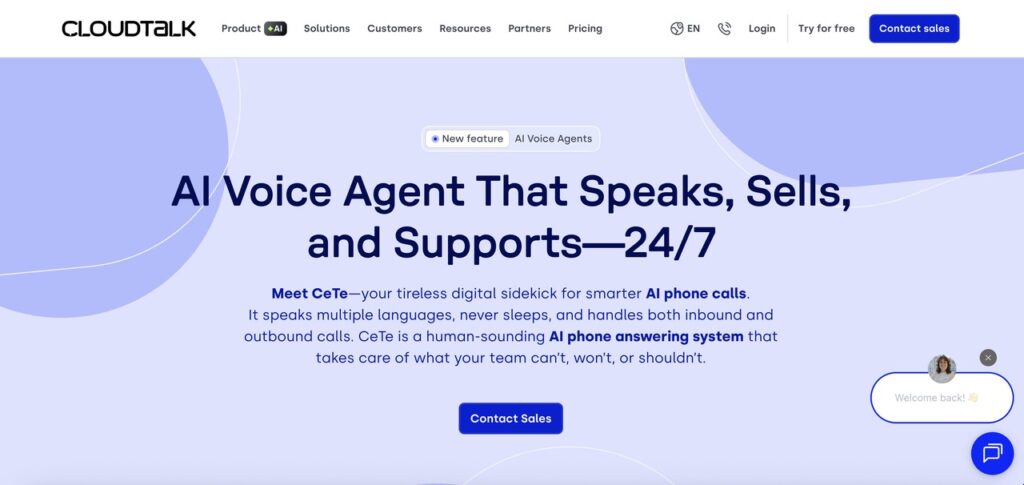
Use cases:
- Sales Teams: Automate call follow-ups, prioritize leads, and personalize outreach.
- Customer Support: Handle repetitive queries using voice bots and streamline call routing.
- Operations: Integrate with mobile CRM and ticketing tools like HubSpot, Salesforce, and Pipedrive for end-to-end automation.
- Remote & Hybrid Teams: Centralized dashboards, AI analytics, and high-quality Wholesale VoIP for seamless collaboration.
Why it matters: CloudTalk goes beyond traditional IVR by combining AI voice automation and data intelligence. It enables businesses to deliver faster, smarter, and more personalized voice experiences while reducing agent workload and operational costs.
5. Drift Conversational AI
Website Link: DrfitConversationalAI.com
Focus:
- Conversational AI that puts sales first and is good at finding good leads.
- Routing high-intent leads to sales reps in real time is something that only we can do.

Best fit for:
- B2B companies with long or complicated sales cycles, where it’s very important to quickly and accurately qualify leads.
6. HubSpot ChatSpot (AI-Powered CRM Bot)
Website Link: hubspot.com
Known for:
- HubSpot’s CRM ecosystem.
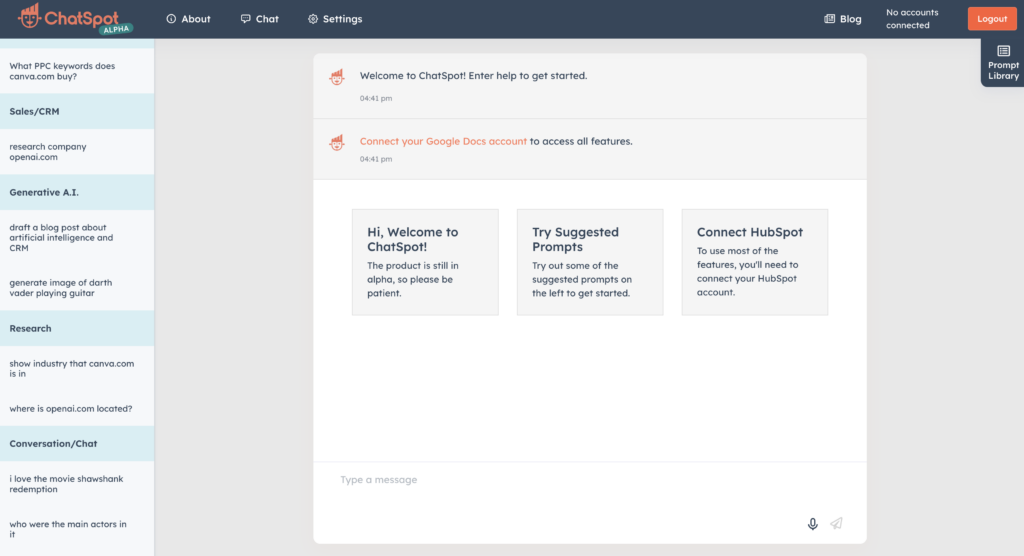
Strength:
- Direct integration with customer records, pipelines, and email campaigns.
Best fit for:
- Businesses already using HubSpot that want AI-powered support and sales agents seamlessly embedded in their CRM workflows.
7. Predis.ai
Website Link: Predis.ai
Known for:
- Social content automation + AI workflows, now expanded into agent-building.

Strengths:
- Generates contextual responses tied to sales and marketing campaigns.
- Automates engagement, lead capture, and personalized replies.
- Easy integrations with CRM and marketing tools.
Best fit for:
- Businesses that want sales-driven agents with marketing intelligence built in.
8. BotPenguin
Website Link: botpenguin.com
Known for:
- Quickly deploying AI agents that drive retail sales and customer support across multiple channels.

Strengths:
- Handles lead qualification, order updates, and support inquiries 24/7 on your website, WhatsApp, Instagram, and more using GPT‑4‑powered automation.
- Includes seamless CRM integration and smooth handoffs to live agents when needed.
- Offers visual configuration tools to set the agent’s personality, tone, and behavior – ensuring the bot aligns with your brand’s voice and style.
Best fit for:
- Businesses seeking plug‑and‑play AI agents that automate sales and support tasks efficiently – no coding involved.
9. REVE Chat
Website link: https://www.revechat.com/
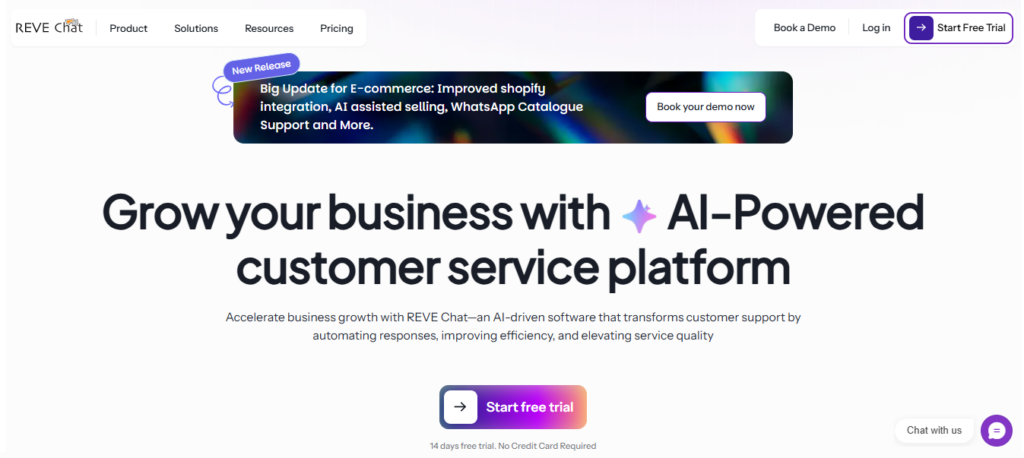
Strength:
- REVE Chat is the AI-powered customer engagement platform that blends lightning-fast chatbots, human touch, and predictive intelligence to skyrocket sales, slash support costs, and build unbreakable customer relationships.
- REVE Chat deploys intelligent agents that greet visitors by name, recall past interactions, and serve solutions before questions are even asked. With omnichannel orchestration, proactive engagement triggers, and enterprise-grade security, it’s the only platform that scales from solo founders to Fortune 500 teams without missing a beat.
Use Case:
- Online Retail Rockstars: Trigger personalized pop-ups based on behavior, guide shoppers with co-browsing, and close deals via secure in-chat payments, conversions don’t just rise, they explode.
- SaaS Growth Engines: Onboard users with interactive walkthroughs, reduce churn with sentiment-driven check-ins, and turn support tickets into upsell opportunities with zero friction.
- Service-Driven Brands: Resolve 70% of inquiries instantly with knowledge-base-powered bots, escalate seamlessly with full chat history, and follow up via WhatsApp or email for closed-loop delight.
- Marketing Mavericks: Capture leads with zero-form friction, score intent in real time, and automate nurture sequences that feel handcrafted, watch SQLs multiply overnight.
Why it matters: REVE Chat delivers triple-digit ROI by combining best-in-class features, AI chatbot builder, video chat, live chat, WhatsApp & Facebook Messenger integration, and advanced reporting into a single platform. It empowers teams to exceed SLAs, uncover upsell signals, and personalize at scale, all while keeping data encrypted and compliant.
Steps to Build an AI Agent That Closes Sales
Creating an AI agent involves more than just turning a switch; it involves creating a system that comprehends your clients and encourages them to take action. In practice, this is the same disciplined approach an AI development company would apply. Here is a detailed framework for doing it correctly:
Here is a step-by-step guide to doing it right:
1. Define Your Agent’s Role
Find out if the agent’s main job is to sell things, help people, or both. A support agent does as little work as possible and fixes problems right away. A sales representative should find out if a lead is qualified and then push them to buy. Being clear now will keep things from getting confusing later.
2. Make a Map of the Client’s Journey and Key Steps
Please check your sales or support funnel. Where are the customers being dropped off? Which tasks are most important: processing refunds, setting up demos, or answering common questions? Map these points to make sure that your AI agent is built to give your business real value instead of just talking.
3. Pick the Right Tool or Platform.
In this case, the Best AI Tools to Make Smart Agents can help. If you already use HubSpot’s CRM, ChatSpot is the best choice. Incase of B2B sales, Drift is the best choice. If you want to do integrations, Zapier AI Agents are the best choice. Consider the size of your business and how complicated your sales process is when choosing a tool.
4. Have Real Conversations About Sales and Support
AI won’t work if it’s too broad. Your agent needs real transcripts, chat logs, and support tickets so that they can understand what your clients are saying, what problems they are having, and what hurts. The more it acts like real customers, the more real and natural it looks.
5. Connect CRM with Workflow Automation
Your AI agent should not work on its own; it should be part of the system. To make sure that everything is tracked and nothing is missed, please connect it to your CRM, ticketing, email systems and workflow automation tools.
6. Check and Test KPIs
Check your progress against key performance indicators (KPIs) like customer satisfaction (CSAT), conversion rate, resolution rate, and time to first response. These numbers will show you if your agent is actually doing things or just talking.
7. Always Try to Make Things Better
Feedback makes smart agents better. Check interactions often, make sure integrations are up to date, optimise scripts, and change workflows. The most successful companies see AI as a living system rather than something they install once.
Conclusion
The era of static FAQ bots is over. Customers now expect AI that can act—booking appointments, processing payments, qualifying leads, and handing off to humans when needed. That’s why businesses are turning to the Best AI Tools to Build Smart Agents: platforms that don’t just chat but sell, support, and scale with your workflows.
The best tool for you will depend on how big you are, what industry you’re in, and what your growth goals are.. Examples of these include HubSpot for CRM-native AI, Drift for B2B sales, Chat Data for customer-aligned insights, Zapier for integrations, and Predis.ai for marketing-powered engagement.
These agents turn conversations into actions. If you want more sales, happy customers, and lower support costs, the answer is clear: stop using question-answering bots and start making AI agents that close deals.


